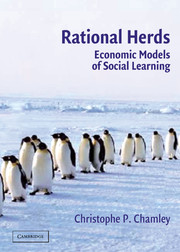Book contents
- Frontmatter
- Contents
- Preface
- 1 Introduction
- PART ONE Social Learning
- 2 Bayesian Tools
- 3 Social Learning with a Common Memory
- 4 Cascades and Herds
- 5 Limited Memories
- 6 Delays
- 7 More Delays
- 8 Outcomes
- 9 Networks and Diffusion
- 10 Words
- PART TWO Coordination
- PART THREE Financial Herding
- References
- Author Index
- Subject Index
5 - Limited Memories
Published online by Cambridge University Press: 12 January 2010
- Frontmatter
- Contents
- Preface
- 1 Introduction
- PART ONE Social Learning
- 2 Bayesian Tools
- 3 Social Learning with a Common Memory
- 4 Cascades and Herds
- 5 Limited Memories
- 6 Delays
- 7 More Delays
- 8 Outcomes
- 9 Networks and Diffusion
- 10 Words
- PART TWO Coordination
- PART THREE Financial Herding
- References
- Author Index
- Subject Index
Summary
To learn one needs to forget.
When agents observe a sample of past actions or different sets of neighbors, they do not share a common public history. The diversity of observations may facilitate social learning because there is no common public history that dominates all individual beliefs. Social learning may be faster if agents observe a smaller sample of past actions. As the social learning cannot be summarized by the martingale of the public belief, the analysis of the convergence of beliefs and actions requires new tools: the average social welfare function, which operates like a Lyapunov function, and the welfare-improving principle.
In all models so far, agents know the entire history of actions. This assumption may be too strong when the number of periods is large. (Note, however, that the entire history is summarized by one number, the public belief.) It is now relaxed: each agent observes only part of the past. We have seen in the previous chapter how the commonly known history of actions can dominate private beliefs and prevent agents from revealing their private information through their actions. If the common memory prevents the diffusion of private information, a restriction on the observation of past actions may be efficient.
Two settings are considered. In the main one, agents are put in an exogenous sequence, as in all models of social learning in previous chapters, but they observe a small random sample from the set of past observations. The sampling is done over all past observations and not just over the most recent ones.
- Type
- Chapter
- Information
- Rational HerdsEconomic Models of Social Learning, pp. 95 - 114Publisher: Cambridge University PressPrint publication year: 2003



